
In Greek mythology, Agamemnon was a king of Mycenae, the son, or grandson, of King Atreus and Queen Aerope, the brother of Menelaus, the husband of Clytemnestra and the father of Iphigenia, Electra or Laodike (Λαοδίκη), Orestes and Chrysothemis. Legends make him the king of Mycenae or Argos, thought to be different names for the same area. When Menelaus's wife, Helen, was taken to Troy by Paris, Agamemnon commanded the united Greek armed forces in the ensuing Trojan War.
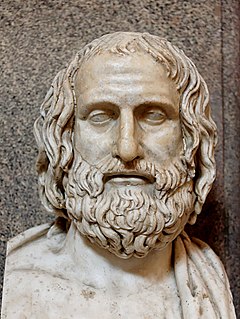
Euripides was a tragedian of classical Athens. Along with Aeschylus and Sophocles, he is one of the three ancient Greek tragedians for whom any plays have survived in full. Some ancient scholars attributed ninety-five plays to him, but the Suda says it was ninety-two at most. Of these, eighteen or nineteen have survived more or less complete. There are many fragments of most of his other plays. More of his plays have survived intact than those of Aeschylus and Sophocles together, partly because his popularity grew as theirs declined—he became, in the Hellenistic Age, a cornerstone of ancient literary education, along with Homer, Demosthenes, and Menander.
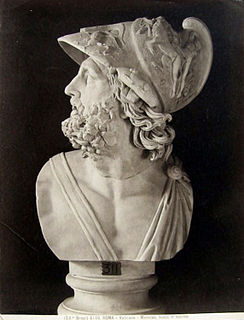
In Greek mythology, Menelaus was a king of Mycenaean (pre-Dorian) Sparta, the husband of Helen of Troy, and the son of Atreus and Aerope. According to the Iliad, Menelaus was a central figure in the Trojan War, leading the Spartan contingent of the Greek army, under his elder brother Agamemnon, king of Mycenae. Prominent in both the Iliad and Odyssey, Menelaus was also popular in Greek vase painting and Greek tragedy, the latter more as a hero of the Trojan War than as a member of the doomed House of Atreus.

Helios, also Helius, in ancient Greek religion and myth, is the god and personification of the Sun, often depicted in art with a radiant crown and driving a horse-drawn chariot through the sky. He was a guardian of oaths and also the god of sight.

In Greek mythology, Atreus was a king of Mycenae in the Peloponnese, the son of Pelops and Hippodamia, and the father of Agamemnon and Menelaus. Collectively, his descendants are known as Atreidai or Atreidae.
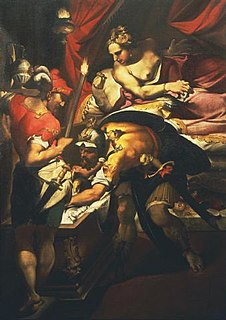
In Greek mythology, Aërope was a daughter of Catreus, the king of Crete, and sister to Clymene, Apemosyne and Althaemenes. She was the wife of Atreus, and by most accounts the mother of Agamemnon and Menelaus.

In Greek mythology, Thyestes was a king of Olympia. Thyestes and his brother, Atreus, were exiled by their father for having murdered their half-brother, Chrysippus, in their desire for the throne of Olympia. They took refuge in Mycenae, where they ascended the throne upon the absence of King Eurystheus, who was fighting the Heracleidae. Eurystheus had meant for their lordship to be temporary; it became permanent because of his death in conflict.
In Greek mythology, Pelopia or Pelopea or Pelopeia was a name attributed to four individuals:
In Greek mythology, Tyndareus was a Spartan king.
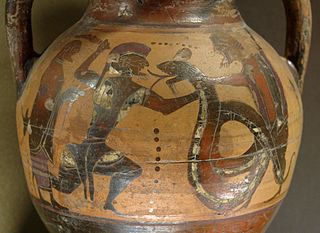
In Greek mythology, Pelops was king of Pisa in the Peloponnesus region. His father, Tantalus, was the founder of the House of Atreus through Pelops's son of that name.
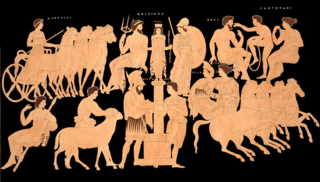
In Greek mythology, King Oenomaus of Pisa, was the father of Hippodamia and the son of Ares. His name Oinomaos signifies him as a wine man.
In Greek mythology, Chrysippus was a divine hero of Elis in the Peloponnesus. Sometimes referred to as Chrysippus of Pisa (Greece).

Iphigenia in Tauris is a drama by the playwright Euripides, written between 414 BC and 412 BC. It has much in common with another of Euripides's plays, Helen, as well as the lost play Andromeda, and is often described as a romance, a melodrama, a tragi-comedy or an escape play.

Senecan tragedy refers to a set of ten ancient Roman tragedies, probably eight of which were written by the Stoic philosopher and politician Lucius Annaeus Seneca.
In Greek mythology, Nauplius is the name of one mariner heroes. Whether these should be considered to be the same person, or two or possibly three distinct persons, is not entirely clear. The most famous Nauplius, was the father of Palamedes, called Nauplius the Wrecker, because he caused the Greek fleet, sailing home from the Trojan War, to shipwreck, in revenge for the unjust killing of Palamedes. This Nauplius was also involved in the stories of Aerope, the mother of Agamemnon and Menelaus, and Auge, the mother of Telephus. The mythographer Apollodorus says he was the same as the Nauplius who was the son of Poseidon and Amymone. Nauplius was also the name of one of the Argonauts, and although Apollonius of Rhodes made the Argonaut a direct descendant of the son of Poseidon, the Roman mythographer Hyginus makes them the same person. However, no surviving ancient source identifies the Argonaut with the father of Palamedes.

Auchenaspis salteri is an extinct species of armored jawless fish of the order Thyestiida from the Late Silurian of England. In England, A. salteri's fossils are found in extreme abundance in the Lower Old Red Sandstone strata in Ledbury, Herefordshire.
In Greek mythology, the name Orchomenus may refer to:

Thyestes is a first century AD fabula crepidata of approximately 1112 lines of verse by Lucius Annaeus Seneca, which tells the story of Thyestes, who unwittingly ate his own children who were slaughtered and served at a banquet by his brother Atreus. As with most of Seneca's plays, Thyestes is based upon an older Greek version with the same name by Euripides.
Apollodorus of Tarsus was a tragic poet of ancient Greece who is mentioned by Eudocia and in the Suda as having written six tragedies ; only the titles of these plays have survived. Nothing further is known about him.
Thyestes is a lost tragedy by Euripides. The play may have concerned the myth of Thyestes' seduction of Areope, the wife of his brother Atreus, and Atreus' subsequent revenge on Thyestes, killing his children and serving them to him at a feast.










